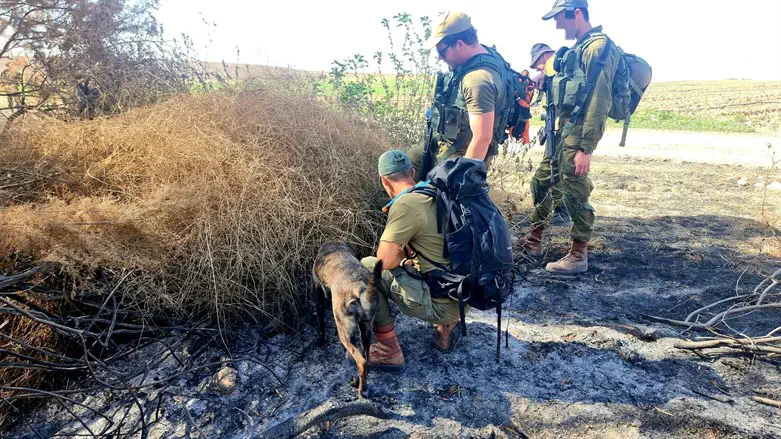
Mike Ben Yaakov, head of the Israel Dog Unit, talks about the determined activities of the unit's volunteers to locate body parts in the open areas surrounding Gaza.
"Since the Sunday after the Hamas attack on the Gaza periphery, we have been in the south. We have teams that are working to locate the missing people. At first there was hope to locate them, but now we are searching for bodies and body parts," says Ben Yaakov and adds that the search missions are carried out both following concrete information and as part of a general scan of the entire area.
"We are working in cooperation with the army," he says, recounting information that comes in about specific landmarks, where missing people were seen by eyewitnesses or whose phone location or the location of their vehicle show that they were there. The unit's members go out with the dogs to search after receiving relevant information.
Ben Yaakov talks about specific information about people who fled the party in Re'im or the kibbutzim. The search for them continues and is also carried out in extensive areas that were already searched but there is "reason" to consider that they are not completely cleared. He also says that "there are areas that they did not enter at first due to fear of encounters with terrorists, and during the first week these did happen, and actually, there are places where there is such a fear even now."
"There are places that we weren’t allowed to enter, but families asked us to continue the search and we have gone out again to search. So there were places where we wanted to search for missing people in the first few days and we couldn't because of the fear that there were terrorists there," he says, noting that “yes, our people also worked under fire.”
"Part of our contribution was in locating terrorists as well as intelligence information that could be found on those terrorists, whether it was maps or other documents, so we definitely contributed to the war effort in diverse ways."
Regarding the work with the dogs, Ben Yaakov points out that his teams work with two types of dogs. There are rescue dogs that look for a living person by smell or odor, and there are dogs that look for other smells which help them find dead people out in the field.
In response to our question when the last findings were found, Ben Yaakov says that "yesterday we found the remains of a body. I'm not saying where because I don't know what kind of communication there is with the families and I don't want to cause people any more despair, but what we found yesterday was definitely that of a human being. Sometimes we are not sure and the finding is taken for identification and examination."
About his team’s mental struggles, Ben Yaakov says: "Our people are dedicated and full of a sense of mission. They are happy to work even under these conditions to bring a case to closure. There are still dozens of people who we have not been able to locate and we want to help these families and unravel the mystery of each and every missing person. The people are dedicated, but there is definitely a traumatic effect on everyone. We have the support of professionals and, if necessary, check our team members and talk to them."
Asked how much longer he thinks the teams and dogs will be in the field working on this mission, he replies, "The police and IDF have gotten to know us well. They know that there is no substitute for the quantity and quality of the dogs we have, and I assume that as long as there are unsolved cases and as long as there is intelligence information, they will continue to call us and trust us. Unfortunately, the first round of the war might be behind us, but the war continues, and the northern front is also heating up. So unfortunately, we are preparing for a lot more work. I hope this won't happen, but we are prepared for it."
As for the difficulty faced by the Dog Unit during the search, Ben Yaakov says that over and above the difficulty of entering the area in the first days, this does not exist today because of the security given to the teams, but there is sometimes a bigger problem in the open and sandy areas more than the dense areas, since tanks and army vehicles have travelled over the sandy area and layers of sand cover quickly, while dense areas are kept relatively sterile because fewer people and equipment have passed through them.
